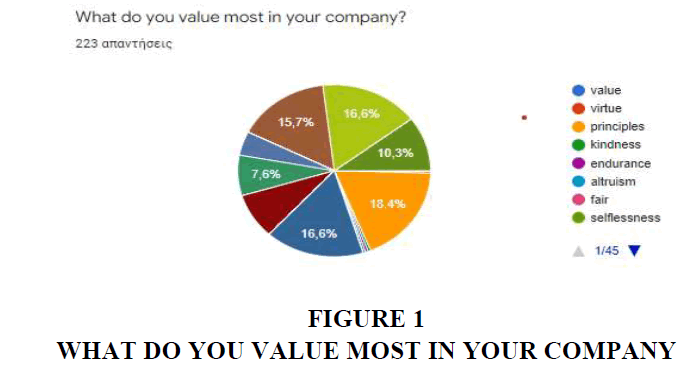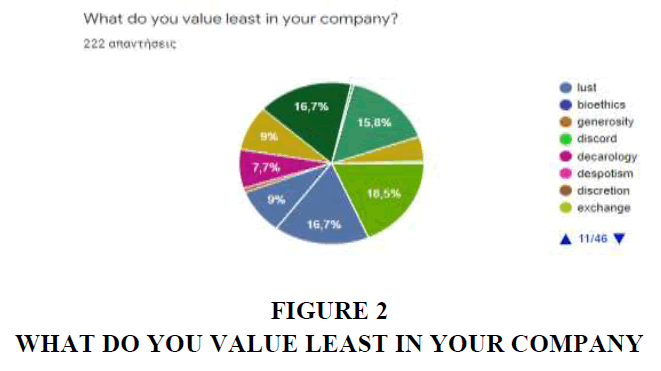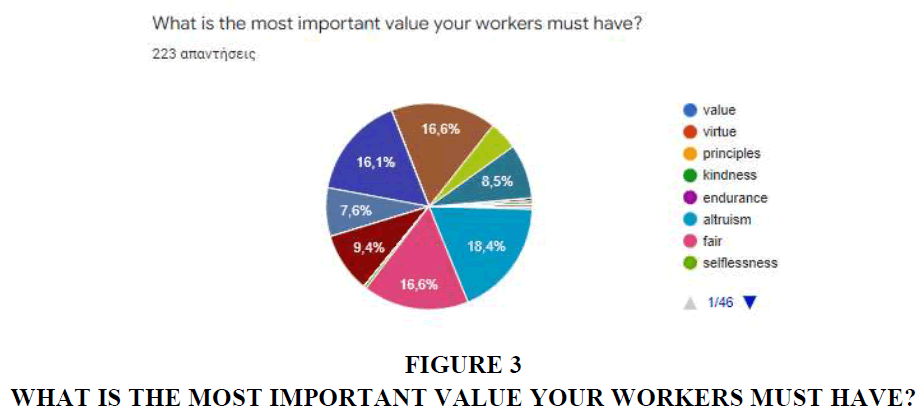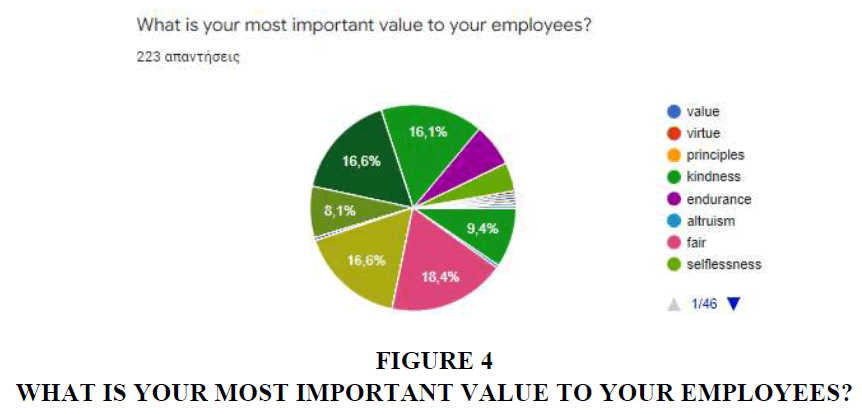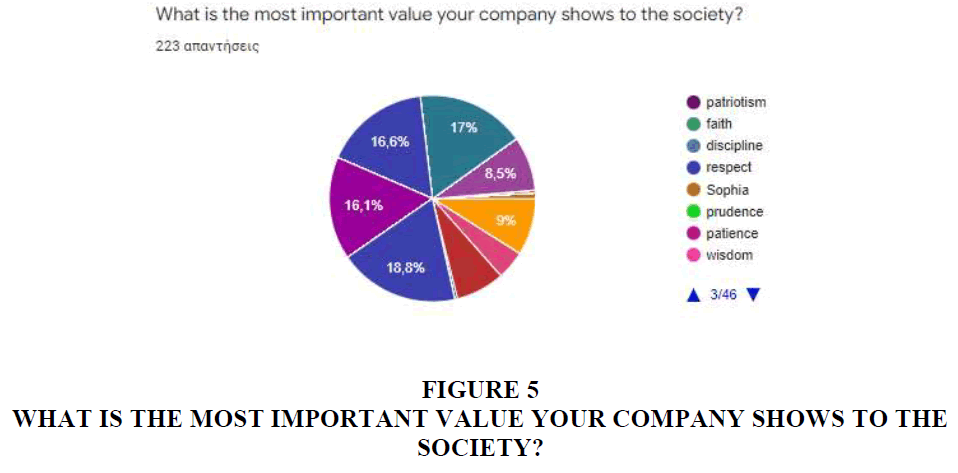Research Article: 2022 Vol: 25 Issue: 6
CORPORATE GOVERNANCE AND ETHICS IN WESTERN MACEDONIA GREECE
Metsiou Anastasia, University of Western Macedonia
Citation Information: Anastasia, M. (2022). Corporate governance and ethics in western Macedonia Greece. Journal of Legal, Ethical and Regulatory Issues, 25(6), 1-8.
Abstract
In recent years, more than ever, there has been a growing need for corporate ethics, corporate social responsibility, corporate governance as well as human resource management. Undoubtedly, businesses are part of every social formation and their relationship with society is characterized interactional. Thus, every action taken by a business has multiple impacts to the society. These multidimensional effects are connected with the company’s production, distribution system, the company’s relationship with the consumers and its suppliers, with the human resources and all in all, with what are considered as “corporate culture and presence”. Therefore, a company must be interested in the well-being and development of the society in which it operates, by performing “Corporate Social Responsibility” and “Business Ethics”, involving actions like charities, taking precautions and actions that can help in solving social issues and problematic situations, by committing to the quality of products and services it provides to the society, by shielding the human rights, the health and safety of the people as well as the environment. A subject that has also aroused an important interest is the relationship developing between business and society, and especially small societies, where the owners are well-known, as in the prefecture of Western Macedonia and it has become clear that the operation of businesses is connected with, and also affects, a significant number of different social groups inside or outside the boundaries of their activity. Thus, companies should be committed to their ethical and social responsibility themes in order to ensure the people’s appreciation and their company’s fame and social “image”. That must be obtained to all society’s members the older and especially the younger ones, because the younger generations of consumers, those who will dominate the market for decades to come, show a great appreciation to the companies that take socially responsible actions and show business ethics and are also willing to live up to the expectations of social responsibility and people’s and the environment’s well-being. This article shows the outcomes of practicing social responsibility and ethics to the prefecture of Western Macedonia by companies that thrive in the region, showing that a good fame is as important as earning money, in a sense that they choose to adopt Corporate Social Responsibility and Ethics because they believe in it and not because they are driven to it by the need to cover up some other non- sustainable practices or because they good intentions are imposed on them.
Keywords
Corporate Social Responsibility, Corporate Governance, Ethics, Western Macedonia Greece.
Introduction
Corporate Social Responsibility is divided into categories; the first category is the “skeptical”, when the company shows a cautious and skeptical attitude towards the CSR, followed by the “utopian”, when a company has a moral obligation to every person and aspect involved and the “realistic”, which concerns the impact of CSR on a business in all the factors involved. Specifically the “Green Paper”, CSR concerns the voluntary integration of social and environmental issues taking place into the company's actions but also in the company's interaction with other parties and the impact of this interaction on society.
CSR is not merely a temporary social interest but a constant commitment of the company’s ethical behavior and contribution to economic development and optimization of the quality of life of its employees as well as the local community and the environment. CSR describes the actions and the obligations of a company that make it accountable to its partners and the society, taking into consideration that a company’s decisions taken will have multiple impacts in the local but also in the wider society and the environment. The company's executives are committed through CSR to implement policies and actions based on fundamental values and any cultural and national differences and their goal should not only to acquire a profit but also to adopt a behavior with primarily moral and social elements (Akhmetshin et al., 2018).
Corporate Social Responsibility is not a new concept but has appeared since the Ancient Times, having a different name and background, but the same philosophy, appearing in the form of “sponsorship” in Ancient Greece. The ancient institution of sponsorship was the financing and support of Athenian citizens by wealthy Athenians and it concerned the provision of money for a number of social functions. The institution of sponsorship was particularly important for the Athenian Republic and it strengthened both the social interaction of the inhabitants and the economic prosperity of Athens. It should be emphasized that the institution of sponsorship in Antiquity was highly honorable and was enshrined in law, as it was considered the highest honor for a wealthy Athenian to provide resources on his own initiative to the State and society and especially the poor, who, therefore, became able to benefit without being excluded due to the unequal distribution of wealth. In fact, the sponsors were notified to the whole society and were appreciated for their actions. The same attitude occurs towards companies that show Business Ethics and SCR.
Nowadays, Corporate Social Responsibility according to Arnesen & Weis (2007), has proven to be not only a charitable purpose but a crucial way of social interaction between the company and its employees but also between the company and the wider social community and CSR invests in the demonstrated trust of all the parties involved, demanding the existence of creative dialogue and transparency in relationships, which must be distinguished by a long-term sense of trust. Corporate Social Responsibility provides confidence to a company's value system and its strategic planning must have long-term validity, by shaping the company's strategies, in such a way that enables a long-term value perspective in the company. That is, not only by aiming at presenting a "good" image of the company to the public but also to shape the "identity" of the company consisting with the social needs. Based on these components, Alexander (2006) connects Corporate Social Responsibility’s actions with the social views of employees and consumers, thus promoting the company and ensuring its support from the consumer public. The company’s actions are motivated initially by logic, which states that Corporate Social Responsibility according to employees enhances the provision of work respecting the current legal framework but always converging in cases of health and other emergencies.
The Corporate Social Responsibility also consists in taking the necessary measures as not to cause ecological damage to the environment but also taking actions on social and environmental issues, possibly even by setting up a charity or even creating or processing its products and services based on its principles (Duggal, 1997; Duggal, 2010).
In recent times, the concepts of "ethics" and "responsibility" are concepts inextricably linked to the concepts of progress and culture in every field of human action and even in the field of business. All in all, business is a field of action for people, which plays an important role in guarding collective responsibility, economic development and social cohesion. In fact, in the era before us, which is characterized by rapid technological developments and the prevalence of globalization, a new business model has been established, distinguished by the concepts of corporate social responsibility and business ethics, which are pillars of business development. Business ethics contributes greatly to maintaining social cohesion and achieving the prosperity of a society and in addition it gives the company high added value, through the integration in the course of the company and actions that have various dimensions, social, environmental and cultural nature, contributing in the sustainable development of the business with "foundations" that are based on ecological, economic and socio-cultural values (Boyd, 2004; DiUlus, 1999).
Ethics in Business
According to Aspelund et al. (2017), business ethics, otherwise known as corporate ethics, is a multifaceted concept that includes the concepts of corporate social responsibility, thus meaning the set of rights and obligations between a company and its partners and society, but also coincides with the presence of the "moral" leader and corporate governance. Undoubtedly, it is also related to the concept of "political economy", since we are referring to business activities, and business ethics is indeed a key element of a company's financial success, because it is the material responsible for resolving many critical management issues of a business. Business ethics is based on principles concerning the personal-individual ethics displayed by each member of the business, inspired by the principles of justice, integrity and consistency, reliability and truth. These principles are applied both inside and outside the company, the relationships with employees and shareholders but also with customers and society in general and are formed based on the business planning of the company and its vision for the future. Undoubtedly, it aims at the company’s profit and the increase of the sales but also of the recognizability of the company and it always starts from the leader, who is the top of the company (Ha et al., 2019).
Philosophically, our approach begins with Kant's ethics, whose critique was a unique approach to the utilitarian remnants of other views of ethics, which advocated a final reward or punishment, since autonomous conscience and moral perception were initially recognized as something absolute. Kantian ethics advocates that morality stems from good will and has not a natural or divine origin. "Good will" is defined as the will that is subject to universal laws concerning morality and it becomes the "property" of man freely and effortlessly without being subject to coercion. It is a set that consists of ideas, positions and principles and gives a stability to the view of good and law, founded on the basis of humanity and freedom, a term that is not immeasurable but is bound by the presence of laws, imposing both self-respect as well as respect for others by enhancing people's values and motivations (Knight, 2002).
Specifically in business terms “ethics” indicate the need for companies to recognize the complexity of the practice of managing ethical issues related to the operation of a business, which will adopt methods and practices that will be a sustainable reality of business ethics (Li & Wu, 2005). One of the key points of business ethics is whether ethics can be aligned with the pursuit of a business’s goals such as profitability, business competitiveness and maximizing its economic advantage, which will lead to the company’s collective beneficial results. When a business is faced with an ethical issue, a "struggle" between ethical and practical management can often emerge, as ethics require finding ways to understand and deal with a company's possible choices and decisions. Consequently, an ethic as a practice will examine the impact of the rational organization of ethical knowledge on the decision-making processes and ethical judgments that will characterize the business action and the consequences of that action (Fusilier, 1997).
Ethics becomes a "tool" by which companies make decisions by applying socially derived value judgments based on a value background. Understanding ethics as a practice involves analyzing the reasons that indicate why a company acts in the way it does when dealing with ethical issues, since ethical values cannot be expressed as simple rules of conducting business (Mamun et al., 2017).
However, despite the fact that business ethics improve the image of a company and can be a life-saver in cases of legal problems, it can nevertheless prove to be extremely costly for the company, since ethical entrepreneurship consists in providing reliable services and products that are safe for consumers and environment, that are distinguished by rules of conscientious and honest advertising campaign and provide employees with humane and altruistic working conditions (Macy & Terry, 2007). Ethics have multiple approaches with the first being the approach of "compliance", which is characterized by the establishment of rules that define the observance of moral principles and punish those who violate them, since the compliance of people with moral order is considered a prerequisite (Pitts & Kamery, 2002). The second approach of "individual knowledge" is based on the fact that any immoral actions are done because people do not understand the immorality of an action and the need to be morally trained, so they lack the ability to understand the moral issues that arise (Thomson, 2005). The third approach to "citizen participation" concerns the individual's obligation to take an active part in social life. All of the above approaches that frame business ethics respond to some problematic situations that make them difficult to implement, thus giving some experts the opportunity to deviate from business ethics (Weston, 2000). It is necessary to emphasize that it is not enough for someone to act ethically within the limits of his work responsibility, but he should also act as a member of his wider social community, realizing the social needs in time. The problems identified in the three approaches mentioned above relate to the fact that capitalism and economic systems are constantly evolving and because the ethical issues associate with the economic systems the need arouses for companies to adapt business ethics.
Ethics in Business in Western Macedonia
For the article there has been conducted a survey that examines the ethics concerning businesses in the region of Western Macedonia and the results have been made into diagrams showing the ethics that the businesses value most regarding the way they treat their employees, the environment, the society and the ethics that are most and least valuable according to them. A small but thorough questionnaire was distributed on line, via Facebook to a group that consists of small and larger companies in Western Macedonia. Of course the URL was sent and they were all informed for the anonymity of their answers in order to accomplish more genuine answers. Our research sample was small and middle companies, consisting of 1-3 employees. We haven’t chosen bigger companies with more employees as we wanted to extract more answers that show the general view of the ethics that are considered valuable to the companies and furthermore because a bigger research will be conducted in the future fulfilling the results of the already contacted one and the research has focused on finding and interpreting the companies’ ethics that they value most and least. The results were in most cases anticipated but the variety of answers show that modern companies have different ethics evaluation, although the main core is ethical. Our research sample amounted to 223 businesses in a total of 320 that are members of the social community but the sample is considered indicative of the general opinion about ethics. The results have shown the following Figure 1:
Companies value most the presence of “principles” and rules at a rate of 18,4% and “justice” and “confidence” follow at a rate of 16,6% each. The least expectant is the large percentage of the value of “empathy” that rates at 15,7% and at 10,3% there is “truth” followed by “duty” at 7,6%. All the other answers have received lower percentages such as “faith” and “discipline”.
The answer about the least valuable ethics have shown in the Figure 2 that the companies’ answers vary to a percentage of 18,5 to “egoism” followed by “discipline” and “ingratitude” both receiving 16,7% and at 15,8% there is “greed”. It is important to acknowledge that “filthy profits” has received a percentage of 7,7% quite important considering that a company’s main goal is to gain a profit. Nonetheless, companies in Western Macedonia tend to consider that ethics and the best behavior is more important than economics and profit.
The companies have also given a variety of answers considering the most important value their workers must have and many answers have gained a large percentage (Figure 3), such as “altruism” 18,4$, “fair” and “respect” at 16,6%, “confidence” at 16,1% followed by “ideal” at 9,4%, “duty” to 8,5% and “discipline” receiving a fair percentage at 7,6%.
A quite important question that shows the companies’ attitudes towards their employees is the most important value they show towards their employees (Figure 4), thus making a selfcritic and realization of a company’s attitude towards the people that work for them. The results were in most answers anticipated, as “fair” has gained 18,4%, followed by “compassion” and “self-sufficiency” at 16,6%. “Autonomy” has gained a percentage of 16,1% showing that many companies tend to encourage their employees to take part in decisions and to “think out of the box” by showing critical thinking. “Evaluation” at a percentage of 9,4% that is consistent with the company’s will to have employees that are energetic and take actions and “kindness” at 8,1%.
An important aspect of CSR and ethics is the impact the company has on the society and the social environment and the way it should be treated and being taken care of. Therefore the last question emphasizes on the most valuable ethics towards the society, both local and ethnic as well, as we haven’t differentiated the meaning. The given answers show (Figure 5) that companies in Western Macedonia consider one of the most valuable social ethics the “respect” at a percentage of 18,8% and closely to 17% we find “interaction” and that shows clearly their understanding that companies must interact with the society as a part of it. At a high percentage of 16,6% there is “evaluation” and “responsibility” that show the companies’ understanding of their crucial role in maintaining the common wealth. At a percentage of 16,1% there is “voluntary” concerning the efforts and actions that are taken voluntarily with no expectations of gain, other that the common wellbeing. At 9% and 8,5% there are “principles” and “charity” that relate to ethics bounded by law and money given to common causes.
Conclusion
The companies in Western Macedonia tend to have values that show their CSR and ethics towards their employees and the society as well, proving that they value the people more that the economic profit and that is promising for the future of businesses in Western Macedonia considering the fact that most companies show no respect for the people that work for them, neglecting their needs and forget the fact that the people that work for you can accomplish many more when treated right. This research prepares the ground for a more thorough one with more targeted questions that will establish the degree of devotion to ethics.
References
Akhmetshin, E.M., Kovalenko, K.E., Goloshchapova, L.V., Polyakova, A.G., Erzinkyan, E.A., & Murzagalina, G.M. (2018). Approaches to social entrepreneurship in Russia and foreign countries. Journal of Entrepreneurship Education, 21(S2), 1-10.
Alexander, C.S. (2006). The Chicago mercantile exchange: redefining corporate governance. In Allied Academies International Conference. Jordan Whitney Enterprises, Inc.
Arnesen, D.W., & Weis, W.L. (2007). Challenges in international business ethics-applying personal values in the global environment. In Allied Academies International Conference. International Academy for Case Studies. Jordan Whitney Enterprises, Inc.
Aspelund, A., Fjell, L., & Rodland, S.E. (2017). Doing good and doing well? International entrepreneurship and social responsibility.
Boyd, M.W. (2004). Business ethics for unseasoned entrepreneurs: Trends and concerns for professionals and stakeholders. In Allied Academies International Conference. Jordan Whitney Enterprises, Inc.
DiUlus, F. (1999). Organization ethics: An interdisciplinary study. In Allied Academies International Conference: Academy of Educational Leadership.
Duggal, R. (1997). Effectiveness of corporate governance following wealth-reducing takeovers. In Allied Academies International Conference: Academy of Accounting and Financial Studies.
Duggal, R. (2010). Corporate governance in the limelight-again: Do we need global standards?. In Allied Academies International Conference. Academy of Accounting and Financial Studies. Proceedings, 15(1), 22.
Fusilier, M. (1997). Perceptions of the environment as a business ethics issue.
Ha, T.T. H., Khoa, N.B., Huy, D.T.N., Nhan, V.K., Nhung, D.H., Anh, P.T., & Duy, P.K. (2019). Modern corporate governance standards and role of auditing-cases in some Western European countries after financial crisis, corporate scandals and manipulation. International Journal of Entrepreneurship, 23(1S), 1-9.
Knight, K.E. (2002). Can economic and social drivers facilitate a change in corporate governance? Allied Academies International Conference: Academy of Strategic Management.
Li, F., & Wu, Y. (2005). Cultural orientations and business ethics. In Allied Academies International Conference.
Macy, A., & Terry, N. (2007). Teaching ethics, corporate governance, and social economics: Movies as a method. In Allied Academies International Internet Conference.
Mamun, M.A., Shaikh, J.M., & Easmin, R. (2017). Corporate social responsibility disclosure in Malaysian business. Academy of Strategic Management Journal, 16(2), 1-19.
Pitts, S.T., & Kamery, R.H. (2002). The role of business ethics. In Allied Academies International Conference.
Thomson, N.F. (2005). Business ethics and the new employee: Some pitfalls. In Allied Academies International Conference: International Academy for Case Studies. Jordan Whitney Enterprises, Inc.
Weston, R. (2000). Implications for board roles of applying three models of corporate governance. In Allied Academies International Conference: International Academy for Case Studies. Jordan Whitney Enterprises, Inc.
Received: 25-May-2022, Manuscript No. JLERI-22-12079; Editor assigned: 28-May-2022, PreQC No. JLERI-22-12079(PQ); Reviewed: 13-Jun-2022, QC No. JLERI-21-12079; Revised: 01-Sep-2022, Manuscript No. JLERI-21-12079(R); Published: 08-Sep-2022
